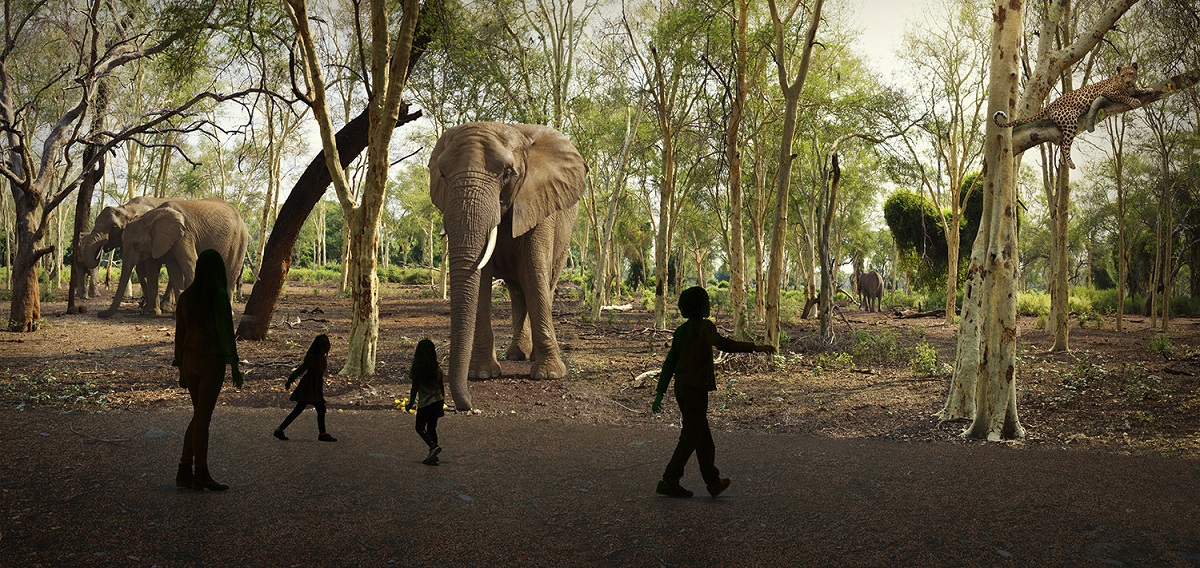
What museums are to art, cinemas to movies and concert halls to music, Illuminariums are to experiential entertainment. That at least is the grand claim of a new visitor attraction launching July 1st in Atlanta.
The project also fits into the growing desire — and market for — virtual experiences shared in concert with other people. As such it plugs right into the Metaverse.
Illuminariums are described as “reprogrammable immersive theaters that surround visitors in a sensory space of sight, sound and scale,” according to its operator Legends, which already runs more than 150 venues and attractions around the world.
The concept is backed by $100 million in funding from various investors.
The heart of the enterprise is a an 8,000-square-foot room featuring 350-foot-long, 22-foot-high projection screen offering a 240-degree field of view. On this, visitors can view a 50-minute film called Wild which emulates being on safari.
“We are in many ways VR without the glasses,” Illuminarium CEO Alan Greenberg told Nate Berg at Fast Company. “VR’s a singular experience, hard to share, hard to talk to people, hard to have a ‘wow’ moment with somebody. We’re not strapping a computer on your back and fitting goggles on your face.”
A second location will open at AREA in Las Vegas next January, another at Mana in Miami, planned for fall 2022 with other US homes being considered including New York City, Chicago, Toronto, Montreal, Los Angeles and Austin.
According to Berg, the actual visitor experience will involve a timed entrance into an 8,000-square-foot room where the walls and floor will be covered in the projected safari film. Broken down into distinct chapters, covering different parts of Africa, the film itself is nonlinear, and able to be entered at any point in its roughly 50-minute run time. Visitors can walk throughout the space or find a place to sit.

READ MORE: Inside the Illuminarium, the $30 million spectacle that’s like walking into a film (Fast Company)
It’s the kind of attraction that has been a staple of theme parks since at least the 1950s. It’s reminiscent of French attraction Futuroscope, which opened in 1987 housing multiple moving image experiences. It included screens showing video on the floor and walls of rooms, motion simulators, projection domes and an IMAX screen showing the first IMAX dramatic film ‘Wings of Courage’ starring Val Kilmer (prior to then IMAX films were docu-style immersions of natural wonders or space).
Jon Kamen, CEO of project partner RadicalMedia, says the sheer scope of its video projection and cutting-edge interactive elements will make the Illuminarium experience unique.
“It’s only in the last few years that you could really contemplate doing what we’re doing,” he told Fast Company.
Certainly, you’d expect the visuals and the 4-D extras to feel state-of-the-art even if the overall concept is not new.
This includes haptic effects in the floor that will make visitors “feel the rumble of a lion walking nearby.” Responsive elements in the bar space will feel “like a flock of birds that bursts from a tree when visitors approach.”
Other elements, drawing on decades-old of sensory cinematic gimmicks, include “dust” that might kick up as you walk by, and even “authentic scents” that will let you get a whiff of your virtual surroundings, Todd Spangler writes at Variety.
READ MORE: ‘VR Without the Goggles’: Illuminarium Set to Launch Its First Immersive Entertainment Location in Atlanta (Variety)
The Gear
Tech-wise, the $10 million film was shot by RadicalMedia on location in South Africa, Botswana, Kenya and Tanzania using a specially built array of six cameras. Images are stitched together to form the panorama and projected using Panasonic 4K laser projectors.
Panasonic has also made “a unique lens” for the projectors to deliver “an enhanced immersive experience”. According to the firm, Panasonic’s engineers created an ultra-short throw lens with minimal offset and loss of light.

READ MORE: Panasonic Named Official Technology Partner of Illuminarium Experiences (Panasonic)
Other manufacturers involved in the venture include Holoplot, which provides “proprietary beamforming and wavefield synthesis technology with the ability to localize and isolate sound” across the venue; Ouster’s OS0 ultra-wide view lidar sensor, which triggers light and sound in response to guests’ movements; and Powersoft, which is responsible for the haptic floor.
Adjacent to its venue in Atlanta, Illuminarium is building a R&D and post-production center called The Illuminarium Lab. Panasonic, Holoplot and XR specialist Disguise are involved here in developing future experiences.
Like Walking Into a Film
The technological hurdles were only part of the challenge, says Kamen. Creating a film for this type of space — with people moving through, entering and leaving at different times, and only able to see a small amount of the entire experience at any one time — called for a new kind of storytelling.
“It’s a bit of a mind-bender, to be honest,” he tells Fast Company. “You have a much bigger physical responsibility, because anybody in the room can be looking in any direction at any time. It’s a completely different discipline of filmmaking.”
Venue designer David Rockwell, founder of Rockwell Group, added perches and areas where visitors can peer out into the space or walk right up to elements of the film.
“To tell a story spatially you have to leave seams in the story for audiences to find themselves in it,” he says. “If it’s a hermetically sealed, complete story, there’s very little opportunity for people to bring themselves into it.”
Yet Wild: A Safari Experience, can only approximate “the beauty and splendor of Africa’s most exotic animals in their natural habitats,” per the project’s marketing. Even with the most hyper-realistic visuals visitors will have to use their own imagination to block out the fact that they are standing on the floor of an exhibition center surrounded by other people who will all at some point be ushered out throw the gift shop.
Exit Through the Gift Shop
The core business model of the Illuminarium is depressingly familiar. The press release says visitors can also “experience” The Illuminarium Café, offering an outdoor patio “facing the BeltLine.” The café is being sold as an “extension of the immersive experience content, serving authentic dishes, beer, and wine from the African continent.”
A $50 “all-inclusive” ticket gifts you a $10 voucher for the café or gift shop which will “retail a wide variety of gifts inspired by the safari experience.”
Further, Illuminarium venues will be promoted as nightlife destinations with a bar “letting visitors experience different virtual settings, from a Tokyo city street to fantastical dreamscapes.”
All this is perfect for Vegas where Paris and Venice themes barely disguise shopping malls but may not live up to the hype if visitors come expecting to be wowed by experience that truly immerse them in the atmosphere of places they have never been.
READ MORE: Tickets Now On Sale for Illuminarium Experiences’ First Venue on Atlanta’s BeltLine Opening July 1, 2021 (Illuminarium)
According to the PR, “Each environment evolves throughout the night to deliver ever-changing visual destinations rendered in real-time. Guests may toast friends as they float on billowing clouds that overlook a glowing sunset; the following night they may encounter the fluorescent light animations and holograms decorating the surfaces of a futuristic street in Tokyo.”
I’m reminded of the distinctly underwhelming World Showcase at Disney World’s Epcot which claims to represent different cultures like Mexico, France, Italy and the UK but are little more than shells for overpriced cafes and gift shops.
Not Stopping There
Illuminarium expects to have 25 to 30 of its venues open in the world’s “great megacities and mega tourism locations” within the next five years. These will be launched as joint ventures.
After Wild, its next production, Spacewalk, will let visitors “stroll across Moon and Mars.” Also planned is film about the depths of the world’s oceans.
“It’s not a movie,” says Greenberg of the space trip. “You’re going to be able to walk on the surface of the Moon!”
For that you’d need a gravity field about 1/6th that of the Earth. It can be done (see NASA flight sims) but I’d wager the experience will be more like a glorified terrestrial planetarium.

